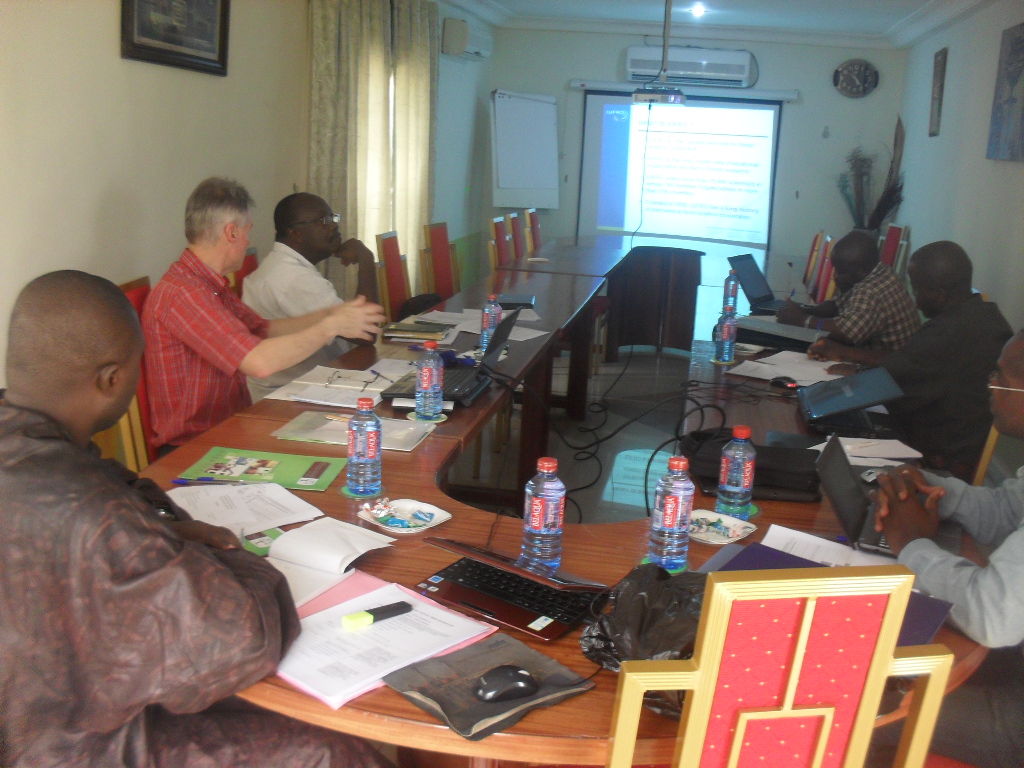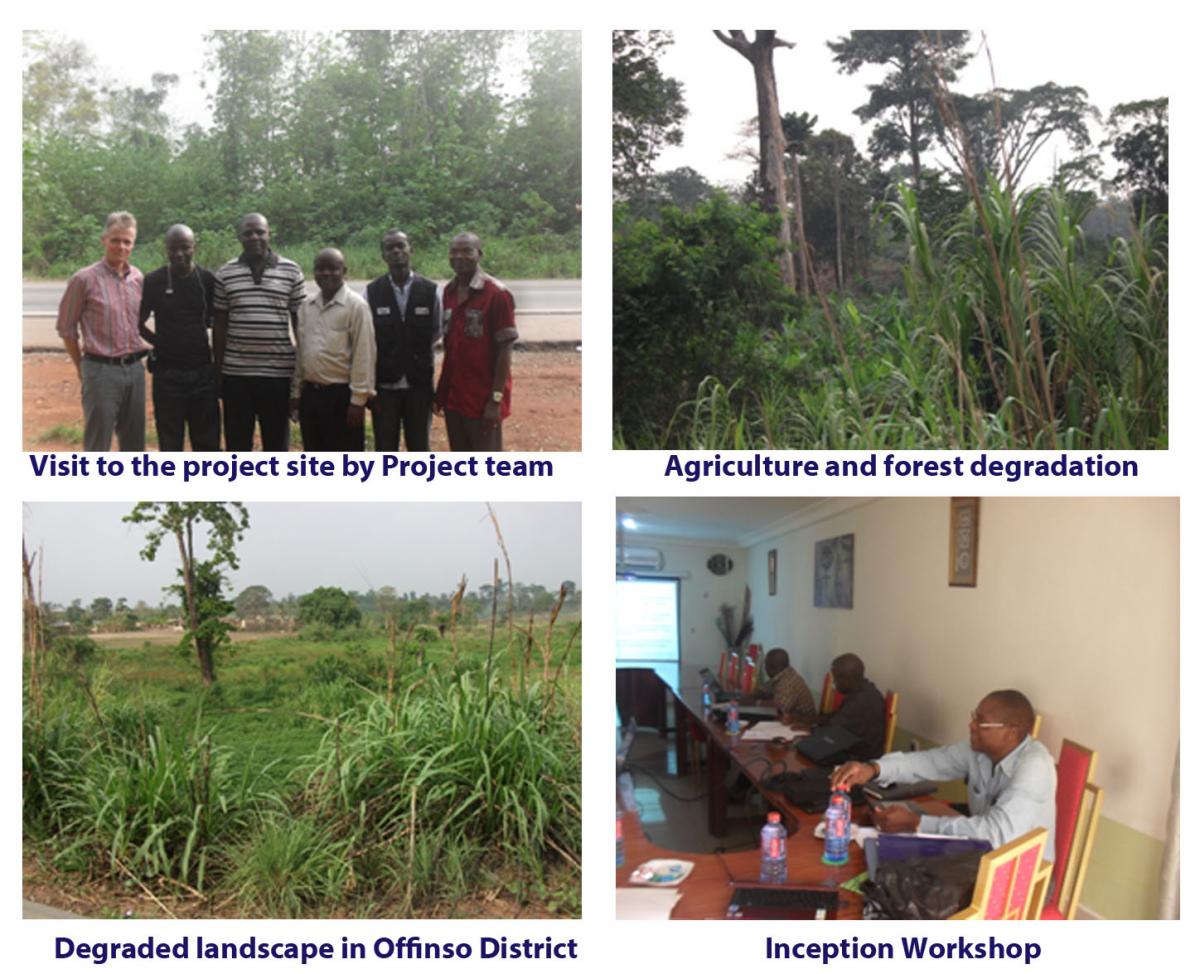“Strengthening the capacity of ITTO producer countries in Africa in generating and disseminating scientific information on Reducing Deforestation and Forest Degradation and Enhancing Environmental Services from Forests”
(ITTO Project Number RED-PA 056/11 Rev.1 (F))
With support from the International Tropical Timber Organization (ITTO), IUFRO-SPDC and FORNESSA have embarked on a new project addressing the challenges of deforestation and forest rehabilitation in Africa. Within the frame of ITTO’s Thematic Programme on “Reducing Deforestation and Forest Degradation and Enhancing Environmental Services in Tropical Forests (REDDES)”, the project aims at generating scientific information on specific pilot areas in Cameroon, Ghana, Liberia and Nigeria, and disseminating this information to policy makers and forest practitioners at the national and regional level through science-policy interactions in close cooperation with the African Forest Forum (AFF).
To this end, national expert groups composed of scientists with various specialisations are in the process of conducting comprehensive scientific assessments in the pilot areas covering the whole range of aspects related to the natural resource base, socio-economic situation and institutional environment impacting on the extent and distribution of forest and tree resources in these areas. Based on these independent assessments and analyses of available scientific information, specific strategies and actions will be formulated for each pilot area on how best to integrate measures to reduce deforestation and forest degradation into current land use practices and economic activities.
National partners in the assessment are the Institute of Agricultural Research for Development (IRAD), Cameroon; the Forestry Research Institute of Ghana (FORIG), Ghana, the Forestry Development Authority (FDA), Liberia; and the Forestry Research Institute, Nigeria (FRIN), Nigeria.
Overall, the project will generate the scientific information needed for policy and management to address deforestation and improve forest dependent livelihoods through sustainable natural resource utilisation and restoration of tropical forests. In addition, the project will further foster cooperation through expanded networking among the forest science community, forest managers and policy makers in the region.
Inception Workshop

In his opening remarks, Dr. Victor Kwame Agyeman, Director, FORIG and Chairman of FORNESSA), emphasised the importance of regional collaboration and expressed the hope that the project will enhance research networking under the umbrella of FORNESSA. The meeting substantially benefited from the presence of Dr. Joseph Cobbinah, Coordinator of FORNESSA and Chairman of the Congress Scientific Committee (IUFRO-FORNESSA Regional Congress) who guided the discussions on best approaches for the assessment in the pilot areas. On the first day of the meeting participants went on a field trip to the Offinso District, located near Kumasi, serving as the REDDES pilot site in Ghana.
Major discussions during the meeting and results obtained are summarised as follows:
- Profile of pilot areas: the team agreed on developing a uniform format for the description of the pilot areas, in order to allow direct comparison between the sites. To this end, a special questionnaire will be developed for use in all pilot areas.
- Selection of pilot sites: all four pilot sites will be located in the tropical high forest zone and show various degrees of disturbances through decades of human interventions. It was also emphasised that the focus of REDDES assessment goes beyond climate change addressing all factors driving deforestation and forest degradation. For reasons of efficient assessment and stakeholder consultations the pilot areas should be easily accessible by the team of scientists and selected sites must have characteristics linked to the country definition of forest
- Stakeholder consultations: All relevant stakeholders in the pilot areas are to be identified and made aware of the importance of reducing deforestation and forest degradation. Besides stakeholder meetings, the project will also develop easy-to-understand flyers and information leaflets about REDDES.
- Strategies for reducing deforestation and forest degradation: Discussions about possible strategies to address REDDES focussed - amongst others on the need to (a) build on land management practices already in place; (b) ensure that results from pilot sites can be mainstreamed into national REDD+ strategies (c) that local level strategies that are effective in addressing deforestation and forest degradation must be strengthened and reinforced, d) that activities that t require external inputs and support must be distinguished from those that can be implemented by local authorities and stakeholders e) predominant and site specific key drivers of deforestation and forest degradation should be identified.
- Finally, a framework for meetings, country and project reporting was discussed and agreed upon.
-


